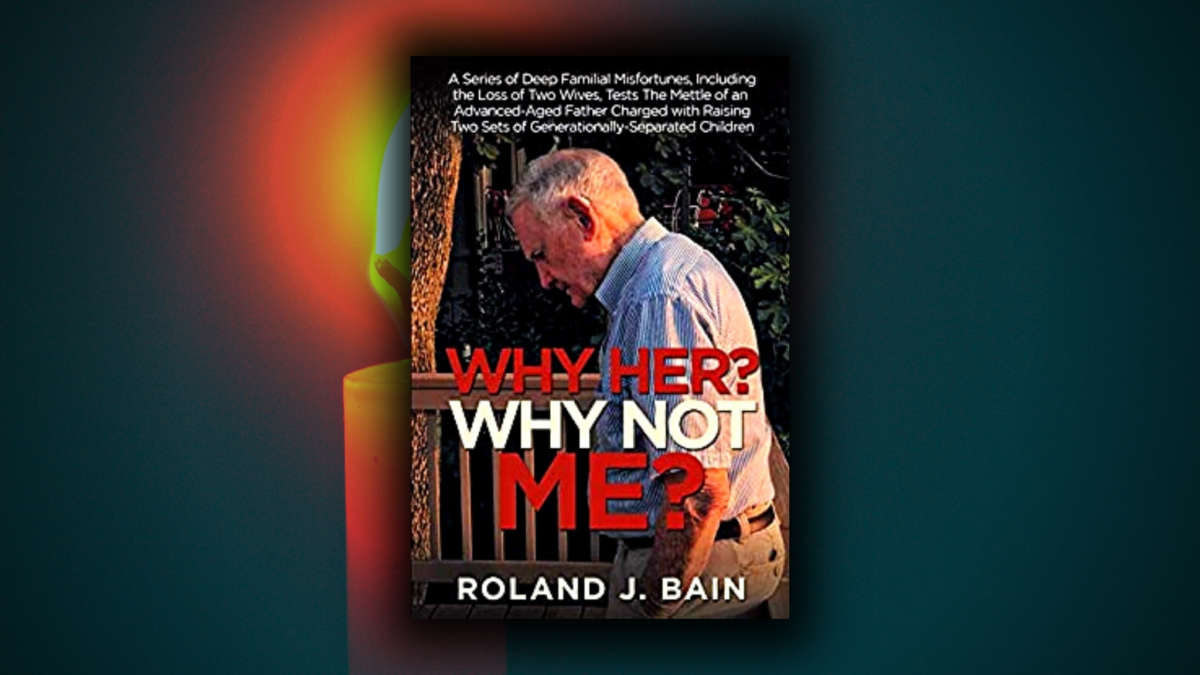Why Her? Why Not Me?
Why Her? Why Not Me?: A Series of Deep Familial Misfortunes (Balboa Press) discloses, in the very title, that tragedy comprises the crux of the forthcoming account. Chapter one’s title, “The First Traumatic Event,” also reinforces the expectation. Despite this threatening storm cloud hanging over the reader’s mind, the opening lines offer a yin to that yang: “During those infrequent occasions when I call a time-out to reflect on life, I marvel at the human being’s ability to survive life’s pitfalls and traumatic events.” When Roland J. Bain then relays, almost immediately, that he’s survived two wives leaving him, the chill of profound grief, loss and tribulation shifts the expectation right back into the portentous and sobering. Will hope survive the onslaught? Let’s find out.
Bain details meeting his first wife, marrying, accepting a Fulbright scholarship to Paris, and the decline and fall of that marriage in quick strokes over the course of that first chapter. The second launches into meeting his second wife, Nancy, and the events to follow comprise the heart and soul of his book. And what a heartbreaking and soul-searing book it is. Not yet, though: now he’s visiting a men’s clothing store every week, buying things he doesn’t need just so he can be around the lovely clerk. Though complicated by the age difference, they date. Superseding all obstacles, they marry and welcome a little boy called Ed, and another, Scott. Four years pass in relative calm.
FIRST COMES LOVE, THEN COMES MARRIAGE, THEN COMES PAIN
Chaos comes early, leaving Ed a cancer survivor at the young age of five. After a lull, our narrator is diagnosed with prostate cancer and Nancy with breast cancer. Yes, this is a true story. Obviously, there are lots of practical and painful logistics to consider on top of the emotional ones. Nancy’s surgery goes first and leads to a mastectomy, which leads to further chemotherapy because the disease has spread. His surgery goes well, her treatment goes on, and 9/11 punctuates the medical events with a more worldwide trauma. Then, the author needs eye surgery, which leads to cataract surgery. Nancy’s cancer spreads to her brain and she worsens exponentially. Still a true story.
There’s only so much anyone can do to alleviate the suffering and the symptoms, and it all hurtles toward rock bottom: “Most people can point to a period in their life that can be described as the absolute worst. The upcoming period was ours.” What more can possibly go wrong? It is merely the worst thing many of us can imagine: death itself.
Before Nancy passes, the author flashes back to his mother’s passing three years ago. His mother, however, had just celebrated her 100th birthday. The two losses can hardly be compared. After the grueling liminal space before, and then the inevitable loss, “Bewilderment set in. Even in a state of mental fogginess, my mind wrestled with what all this could mean. Why had the fickle finger of fate turned in this direction? Why her? Why wasn’t I the one taken? There I was at seventy-four. Why not me? What sense did taking Nancy make, a young woman at age forty-six with two young children? Why her? Why not me? Why? Why? Why?” Still, he must let his boys know. That part is quite hard to read.
SOMEHOW, IN SPITE OF IT ALL, IT’S A WONDERFUL LIFE
The haze of the painful new normal sets in. Meanwhile, the old tragedy of his ex-wife’s abandonment routinely and rudely inserts itself into this current tragedy. While it’s likely impossible for a reader to fully empathize with this obscene level of suffering, it’s also likely impossible not to sympathize for the same reason. Just think about it; Mother’s Day and his late wife’s birthday still come around. Business, work and travel still happen, too, and all bring their own highs and lows even without Nancy. Bain stays stubbornly centered in the love of those passed and present, and it’s a noble position.
His sons endure the more typical trials that come with growing up and growing into themselves, and the author stalwartly parents them through it all as a single Dad. As enough time passes to introduce grandchildren, Nancy remains forever on his mind. The final pages, written by the now-90-year old narrator, reflect on a deeply meaningful life and somehow look ahead with faith and strength. How can someone be so afflicted and yet so enduring? It’s worth reading this book if only to reaffirm your notion of what’s possible when faced with impossible odds.
RELATED POST
“Enter the Enemy:” Letters From the War-Torn Past



